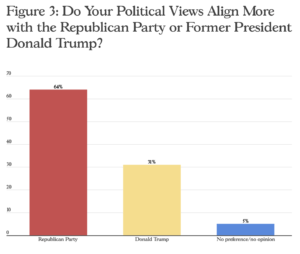Significant divides remain between Democrats and Republicans about United States immigration policy priorities, but significant divides also exist between two types of Republicans: Those more loyal to the party and those more loyal to former President Donald Trump.
This is among the findings of new national research by Morning Consult and the Bipartisan Policy Center. The polling was conducted in April and May 2021.
There are a few areas where Democrats and party-loyal Republicans could find agreement, the data show, if both sides are willing to work together. However, the new poll also found that Democrats are more likely to be willing to compromise to get immigration reform passed than are Republicans.
The new poll also found that Democrats are more likely to be willing to compromise to get immigration reform passed than are Republicans.
And Senate Minority Leader Mitch McConnell has said publicly that he is “100% focused” on stopping the entire legislative agenda of President Joe Biden, a pledge similar to one he made when attempting to block then-President Barack Obama from any legislative success. Because immigration reform is a high priority for Democrats, McConnell could lead the Senate to blockade any proposed bills.
If he does so, however, that will happen against the will of a majority of Americans, who generally favor key pieces of immigration reform, including creating a pathway to citizenship for those already illegally in the country.
Previous polling by Public Religion Research Institute found American public sentiment more closely mirrors priorities of the Biden administration than those of his “America First” predecessor or the Republican Party. For example, 66% of Americans favor allowing undocumented immigrants brought to the U.S. as children to gain legal resident status and 64% favor allowing all immigrants living in the country illegally a path to citizenship provided they meet certain requirements.
Congress seldom votes along the lines of majority public opinion, however, falling into ideologies favorable to each elected official’s base of voters. And currently, Republicans in both the House and Senate tend to skew more toward supporting Trump rather than the party apart from Trump.

How Republicans split over primary loyalty to party versus loyalty to Trump.
The new polling dug into what differentiates Trump-focused Republicans from party-focused Republicans. It found that 64% of Republican respondents said they identify more with the party than Trump, while 31% said they identify more with Trump.
Party-aligned Republicans place greater importance on immigration policies granting temporary and permanent economic visas than Trump-aligned Republicans.
And party-aligned Republicans also place greater importance on allowing temporary or permanent refuge to those living in the United States for many years after fleeing persecution.
Trump-loyal Republicans are more likely than party-loyal Republicans to prioritize preventing immigrants not authorized to enter the U.S. under current laws from migrating at the border. They also are more likely to prioritize removing all immigrants already in the U.S. without authorization.
There are at least two areas where Democrats and party-loyal Republicans — but not Trump-loyal Republicans — rank their priorities in a similar manner. These are not necessarily the top priorities for either side but are areas where both sides express similar levels of interest.
“Reforms that focus on legal immigration could be a pathway for bipartisanship,” the pollsters reported. “While Democrats and Republicans seem divided on many immigration issues, some consensus exists on less controversial matters such as legal immigration that supports the U.S. economy.”
“Reforms that focus on legal immigration could be a pathway for bipartisanship.”
Among the issues where Democrats, independents and Republicans are more likely to compromise is “providing visas for immigrants supporting the U.S. economy by filling positions where companies cannot find U.S. workers.”
“There is more room for policymakers to work together on this issue since none of the parties are unwilling to compromise on this particular policy,” the pollsters said. Another possible area of working together is on “providing visas for immigrants investing in research and innovation for future growth of the U.S. economy.”
On the issue of compromise, however, the poll found “Republicans are less willing to accept Democratic priorities than to drop one of theirs to get to compromise. Although neither Democrats nor Republicans were likely to compromise on their highest priorities, Republicans were less likely to accept a Democratic priority than to drop one of their own at the negotiating table.”
Practically speaking, the authors said: “If Republicans want to pass legislation that would increase economic-based visas for foreign workers, they will find that a majority of Democrats are willing to drop one of their own policy priorities as part of a compromise. Across the aisle, however, for Democrats to pass legislation that would provide legal status to the unauthorized and a means to earn citizenship under certain conditions, less than half of Republicans are willing to compromise and drop one of their priorities to move the reforms ahead.”
Related articles:
What would happen if immigration policies were based on majority opinion in the U.S.?
Coalition of evangelical Christians advocates third way on immigration reform
Biden administration rushing to strengthen DACA, official says
A bipartisan immigration bill has been introduced, but will it garner bipartisan support?
Panelists debate how to ‘normalize’ immigration after ill effects of Trumpism


